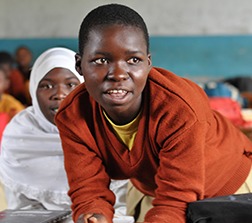- About
- Topics
- Picks
- Audio
- Story
- In-Depth
- Opinion
- News
- Donate
-
Signup for our newsletterOur Editors' Best Picks.Send
Read, Debate: Engage.
| August 24, 2016 | |
|---|---|
| topic: | Economic Inclusion |
| tags: | #bicycles, #development, #Kenya, #Sri Lanka, #World Bicycle Relief, #Zambia |
| located: | Kenya, Sri Lanka, Zambia |
| by: | Vanessa Ellingham |
For anyone who hasn’t heard of World Bicycle Relief before, what’s the back-story, in your own words?
In 2005, in response to the Indian Ocean Tsunami, the Founders of World Bicycle Relief, FK Day and Leah Missbach Day, wanted to help in the recovery phase. They were moved by the images of devastation and wanted to do more than just send money. With a background in bicycle manufacturing, FK thought that a bicycle might provide a way for people to get their lives rolling again. FK and Leah flew to Sri Lanka to ask people directly if a bicycle would be useful. The resounding answer was “yes.”
FK and Leah sourced funding from the bicycle industry and worked with a local Sri Lankan bicycle company to manufacture 24,500 bicycles. The bicycles were distributed to students, entrepreneurs and health care workers. An impact study was completed and the results were overwhelmingly positive. The bicycles were crucial in reconnecting students with schools, entrepreneurs with markets and individuals with health care.
Soon after this initial, large-scale bicycle distribution, World Bicycle Relief was contacted by World Vision Zambia to bring bicycles to their health care programs. World Bicycle Relief has now delivered over 300,000 bicycles in Africa, South East Asia and South America.
What we’ve learned over the past ten years is that a purpose-built bicycle is tremendously effective in rural developing areas where there are few transportation options and little infrastructure. The bicycle is an appropriate and powerful transportation tool that improves economic, educational and health care outcomes.
What is a Buffalo Bike? Why are they the right choice for your work?
The Buffalo Bicycle is a purpose-built bicycle designed to withstand challenging terrain in rural developing areas. Top bicycle engineers have been working on the Buffalo Bicycle over the last ten years and our current model is the 17th generation of our bike. We have a system of product development and field research that connects the end-user to the engineers and supply chain, providing a voice to the demographic at the bottom end of the economic pyramid. By listening to the end user, the Buffalo Bicycle fits the specific needs of the individuals who ride them. Other bicycles that are sold in these areas do not meet the end user’s specific needs and often break down very quickly in this challenging terrain.
The Buffalo Bicycle is sturdy, durable and affordable. It has a rear rack that carries 100kg that can accommodate both goods and people. For more hilly areas, about 20% of the bicycles we distribute have gears.
For developing areas where there is little or no transportation infrastructure and household incomes are limited, a bicycle is a simple, yet powerful tool that can transform lives.
Your program targets education, healthcare and economic development. How do you decide which aspect fits which communities?
We look for high impact opportunities when we implement our programming. In order for our programming to be successful, we seek out good partners – whether it’s an NGO with deep roots in a community or a local school board with a great track record. Our ground partners provide the support and oversight needed to ensure the success of our programs.
Typically, our first introduction to a community is through our education program BEEP (Bicycles for Educational Empowerment Program) or our health care programs. The bicycles provided to students and health care workers through study-to-own and work-to- own contracts are funded through our philanthropic programs. Communities quickly notice the sturdy, new bicycles that students and health care workers are riding.
With exposure to our Buffalo Bicycles through BEEP and health care programming, farmers and entrepreneurs often ask us where they can purchase Buffalo Bicycles. In response, we created a social enterprise side of World Bicycle Relief in order to sell bicycles directly to individuals, NGOs, small businesses and cooperatives and to meet the market demand. Revenue from the social enterprise sales is channeled back into our philanthropic programming.
Palabana, a community in rural Zambia, is a great example of a community that has been transformed by bicycles. Initially, we distributed bicycles to students and teachers through our BEEP programming. Then the Palabana Dairy Cooperative (PDC) asked to purchase bicycles for their dairy farmers who in turn buy them from the PDC with cash or through micro-loans. To date, the PDC has purchased 308 bicycles. Our recent PDC Research Study highlighted a 23% increase in milk deliveries and profits and a 45% reduction in travel time for dairy farmers with Buffalo Bicycles.
What we’ve discovered is that a purpose-built bicycle is a powerful, cross-cutting intervention that provides access to economic activities, education and health care, improving communities on multiple levels. Globally, bicycles have the power to lift hundreds of millions people out of extreme poverty and transform entire communities in rural developing areas.
World Bicycle Relief recently published a report on the impact of your buffalo bikes on dairy farmers in Zambia. Are you looking to do more research into your impact? Why is that important?
Since the inception of World Bicycle Relief, we have been committed to measurement and evaluation. With rigorous data and analysis, we can highlight the efficacy of bicycles to effectively fight poverty, improve academic attendance and performance and change health care outcomes.
Bicycles are often overlooked as a development tool and by publishing data, we hope to encourage global institutions, governments and the private sector to take a closer look at this simple, yet powerful intervention.
Currently, the Stanford Research Institute is conducting a comprehensive research study of our BEEP program in South Africa to be published later this year. And, we will be commencing an academically rigorous Impact Study of BEEP in Zambia in 2017. We will continue to study and publish our results with the goal of scaling our programming to make an even greater and deeper impact.
I’m interested in the education aspect of your work, helping kids to get to school and stay there. Tell me about some of the students who are benefitting most from their bikes. Who have you met who’s inspired you?
In 2015, we expanded BEEP into Kenya with an initial 3,000 bicycles including 100 bicycles to the Bukhaywa Secondary School in Kakamega, Kenya. The challenges that these young girls face getting to school is daunting – long distances, rugged terrain and the threat of sexual violence. It was humbling to hear the daily challenges they overcame just to walk to school.
Angela, a 15-year old girl, lives with her grandmother 10km from school. Her grandmother has high hopes for Angela’s education, but sadly noted that in Kenya girls “are not worth much. In our family, nobody has reached university.” Despite all of this, Angela’s grandmother has high hopes for her and supports Angela pursuing an education. At the same time, she worries about Angela traveling to school and that she could be sexually assaulted along the way. Once Angela was chosen to receive a bicycle from World Bicycle Relief, her grandmother was relieved and now no longer worries about Angela’s commute to school.
Angela is a bright girl and plans to go to university. “I can go outside, abroad and study, so that I can come back here in Kenya and help my fellow Kenyans.” I’m happy to report that Angela is #1 in her class and is studying to be a doctor.
Angela inspires me. What’s important to remember is that there are so many girls just like Angela. When a girl student receives her bicycle at a school distribution, you can see the look in her eyes – that someone cares enough about her to give her a bicycle and wants her to succeed.
Giving a girl a bicycle changes the calculus of her worth and the value of her education within her family and community. These nuances of distributing bicycles to young girls cannot be underestimated. The cultural impact is significant, especially in places like Kenya where girl children are not valued like boy children are.
Your organization is making an impact in many communities on multiples continents. What impact are you most proud of?
I’m most proud of our impact on girls’ education. Through BEEP that targets 70% of the bicycles for girl students, we’ve distributed over 90,000 bicycles, making it possible for many more girl students to stay in school and follow their dreams. Bicycles are providing a path forward for girls who are often forced to drop out of school to help with family chores or just live too far away from school to attend.
The data overwhelmingly shows that educating girls is the best way to combat poverty. But beyond the statistics, I have seen the personal impact bicycles have on girls. Giving a bicycle to a girl child changes the dynamics in her household and in her community. With access to a valuable asset, the worth of a girl child and her education goes up. The bicycle empowers girls and it shows – in their increase in confidence, their pride and most of all, their smiles.
What are your plans for the rest of 2016 and beyond – where is World Bicycle Relief going next?
Our focus for 2016 and beyond is sustainable impact. We are continuously improving bicycle design, our programming and after market support for the bicycles with the goal of making an even deeper impact for the individuals and communities we serve.
The need for reliable transportation in rural developing areas is great. In Southern Africa alone, there are over 500 million people whose only mode of transportation is walking. We are addressing that need both with philanthropic means and through our social enterprise sales. We strongly believe that purpose-built bicycles have the power to lift hundreds of millions out of extreme poverty and into shared prosperity. But, we cannot do it alone.
This interview has been condensed.
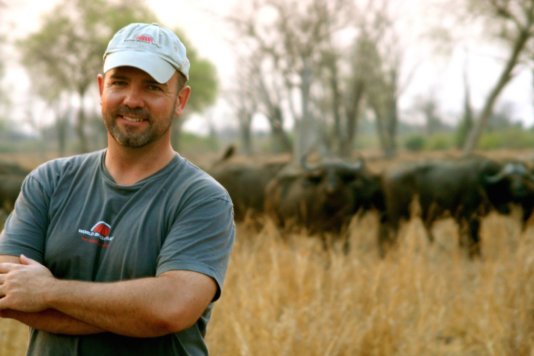
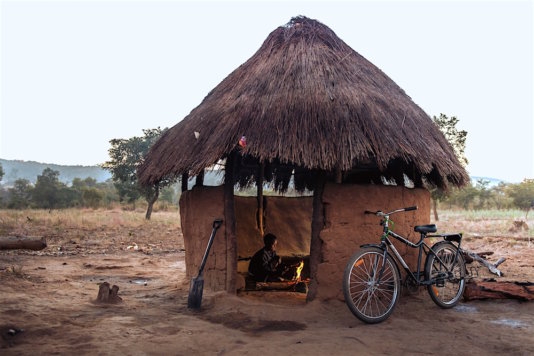
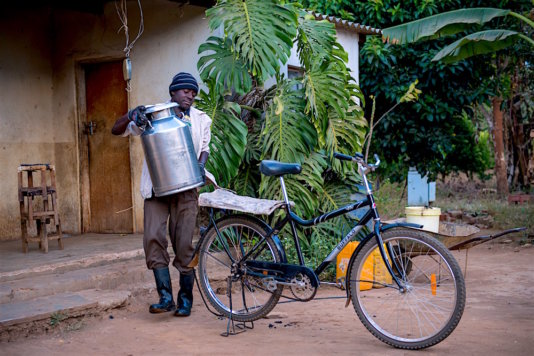
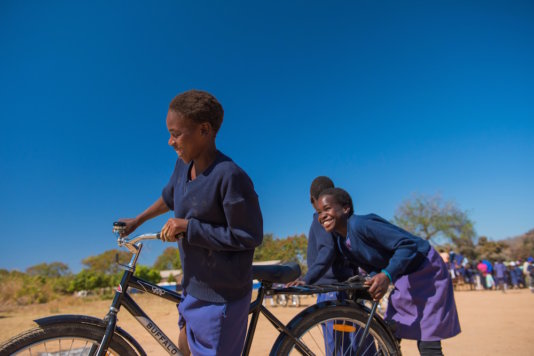
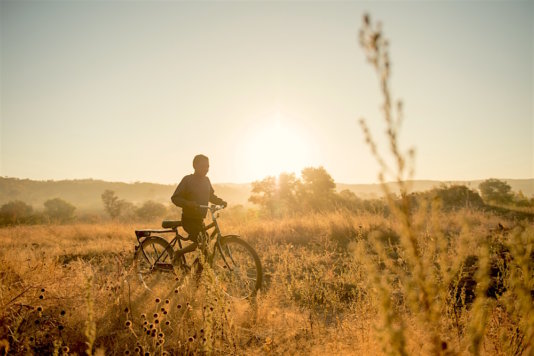
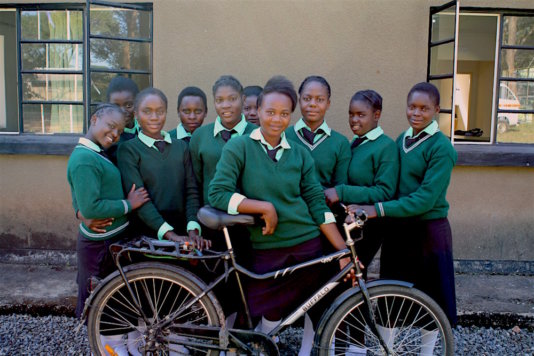
By copying the embed code below, you agree to adhere to our republishing guidelines.

